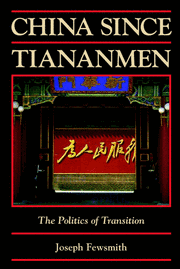Book contents
- Frontmatter
- Contents
- Acknowledgments
- Chronology
- Schematic Overview of Chinese Political Spectrum
- List of Abbreviations and Tables
- Introduction: State and Intellectuals at the Turn of the Century
- Part I Line Struggle Revisited: The Attack on Deng's Reform Program
- Part II Redefining Reform: The Search for a New Way
- 3 The Emergence of Neoconservatism
- 4 The Enlightenment Tradition under Challenge
- 5 The Emergence of Neostatism and Popular Nationalism
- Part III Elite Politics and Popular Nationalism
- Conclusion
- Epilogue
- Notes
- Bibliography
- Index
4 - The Enlightenment Tradition under Challenge
Published online by Cambridge University Press: 05 September 2012
- Frontmatter
- Contents
- Acknowledgments
- Chronology
- Schematic Overview of Chinese Political Spectrum
- List of Abbreviations and Tables
- Introduction: State and Intellectuals at the Turn of the Century
- Part I Line Struggle Revisited: The Attack on Deng's Reform Program
- Part II Redefining Reform: The Search for a New Way
- 3 The Emergence of Neoconservatism
- 4 The Enlightenment Tradition under Challenge
- 5 The Emergence of Neostatism and Popular Nationalism
- Part III Elite Politics and Popular Nationalism
- Conclusion
- Epilogue
- Notes
- Bibliography
- Index
Summary
Prior to 1993, neoconservatism consisted primarily of the ruminations of a handful of intellectuals. It was a diverse and not very coherent movement, drawing on people with distinctly different attitudes and statuses within the Chinese system. Although well connected with some conservative leaders, there was an unmistakable opportunism in He Xin's xenophobic defenses of the government, which contrasted with Chen Yuan's politically more important efforts to articulate an alternative economic agenda. Wang Huning, who had set off internal arguments about new authoritarianism, wrote nothing about the subject as public debate unfolded in 1989, but he would emerge as a politically important advisor to Jiang Zemin in the mid- and late 1990s. People like Sheng Hong and Xiao Gongqin wrote frequently but were intellectuals with limited policy impact, not to mention a different intellectual agenda from others. Yang Ping and Wang Xiaodong can perhaps be regarded as intellectual entrepreneurs who worked to inject previously marginal ideas into the mainstream, though their connections with parts of the political system should not be underestimated.
The appearance of “Realistic Responses” in 1991 marked a certain coming of age of these ideas, not so much a political manifesto of the “princeling faction” (taizidang) – though that element was present – as an argument that China's future lay in pioneering a “third way,” rejecting both Marxism–Leninism (as traditionally understood) and Western capitalism.
- Type
- Chapter
- Information
- China since TiananmenThe Politics of Transition, pp. 101 - 131Publisher: Cambridge University PressPrint publication year: 2001

